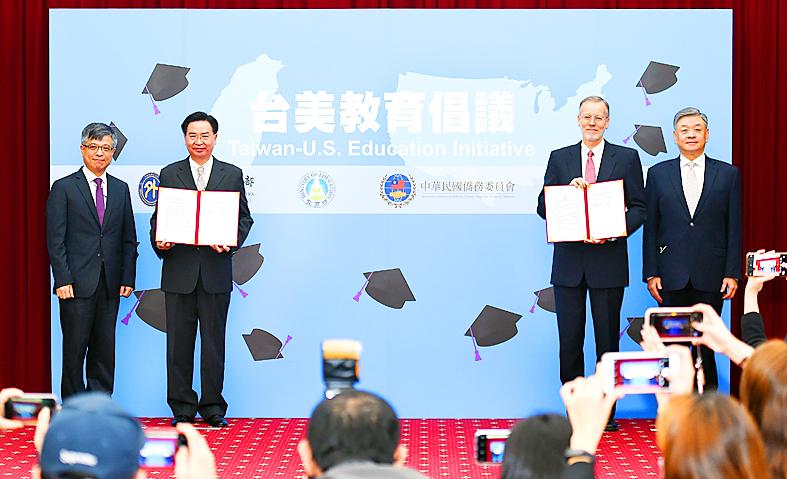The US and Taiwan yesterday launched a new bilateral education initiative that American Institute in Taiwan (AIT) Director Brent Christensen said was aimed at expanding access to Mandarin and English-language instruction and safeguarding academic freedom.
At a ceremony at the Ministry of Foreign Affairs in Taipei for the US-Taiwan Education Initiative, Christensen said that it would “highlight Taiwan’s important role in providing Chinese-language instruction to Americans and to people around the world, and seeks to expand Taiwan’s influence in this area.”
As part of the initiative, the AIT and the Taipei Economic and Cultural Representative Office in Washington on Wednesday signed a memorandum of understanding on international education cooperation that focuses on language education.

Photo: Liao Chen-huei, Taipei Times
The memorandum is expected to remain in effect for five years, with the possibility of an extension, the AIT said.
The two sides have agreed to enhance and to expand their existing educational exchange programs, Christensen said, adding that once regular travel resumes following the COVID-19 pandemic, more Americans would be able to teach and study in Taiwan, and vice versa.
The initiative is “set against the backdrop of two distinct, but related trends,” he said.
These trends were the closure of Confucius Institutes by universities around the world over their role in China-led “censorship and malign influence campaigns,” and Taiwan’s increased commitment to English-language education.
Despite Confucius Institutes in the US closing, there continues to be a strong interest among American and international students in learning Mandarin, Christensen said, adding that Taiwan “can and should play a key role.”
The US is also eager to help provide English-language instruction to support Taiwan’s goal of becoming bilingual by 2030, he said.
Christensen said that the two trends were “rooted in the same principle: Young people should be able to pursue academic and professional opportunities in an environment free from coercion and censorship.”
The new initiative would provide a platform for the US and Taiwan to expand their cooperation in the pursuit of their shared interests and values, he said.
Minister of Foreign Affairs Joseph Wu (吳釗燮) said that it was “particularly meaningful” for Taiwan to strengthen bilingual education cooperation with the US at a time “when academic freedom and freedom of speech in the US and other countries are being invaded by certain political forces.”
Wu described the initiative as a “starting point for comprehensive educational cooperation” between the two nations.
Taiwan is the seventh-largest source of international students in the US, with more than 23,000 Taiwanese enrolled in colleges and universities, Representative to the US Hsiao Bi-khim (蕭美琴) said in a video message to the ceremony.
“Taiwan is also becoming an increasingly attractive destination for American students studying abroad,” she said, adding that the number of American students in Taiwan grew by more than 48 percent last year.

OPTIMISTIC: The DGBAS sharply upgraded its GDP growth estimate from 3.54 percent to 7.71 percent after the Taiwan-US trade agreement signing and given AI optimism The US imported more from Taiwan than China for the first time in decades, as US President Donald Trump’s tariffs reshape trade flows while a global boom in artificial intelligence (AI) fuels demand for tech products. US purchases of goods from China plunged almost 44 percent in December last year from 2024 to US$21.1 billion, US Department of Commerce data showed on Thursday. By contrast, shipments from Taiwan more than doubled during the same period to US$24.7 billion. The soaring Taiwanese shipments to the US reflect the huge expansion in supplies of chips and servers for AI companies, which has completely changed

The Central Election Commission has amended election and recall regulations to require elected office candidates to provide proof that they have no Chinese citizenship, a Cabinet report said. The commission on Oct. 29 last year revised the Measures for the Permission of Family-based Residence, Long-term Residence and Settlement of People from the Mainland Area in the Taiwan Area (大陸地區人民在台灣地區依親居留長期居留或定居許可辦法), the Executive Yuan said in a report it submitted to the legislature for review. The revision requires Chinese citizens applying for permanent residency to submit notarial documents showing that they have lost their Chinese household record and have renounced — or have never

US and Chinese fighter jets briefly faced off above waters near the Korean Peninsula this week, Yonhap News agency reported, marking a rare confrontation in that area between the two superpowers. About 10 US fighter jets on Wednesday departed an airbase in Pyeongtaek, South Korea, for drills above international waters off South Korea’s western coast, the news outlet cited unidentified military sources as saying. While the US planes did not enter China’s air defense identification zone, Beijing scrambled planes as they neared that region, the report said. “The Chinese People’s Liberation Army organized naval and air forces to monitor and effectively respond

Taiwan has secured another breakthrough in fruit exports, with jujubes, dragon fruit and lychees approved for shipment to the EU, the Ministry of Agriculture said yesterday. The Animal and Plant Health Inspection Agency on Thursday received formal notification of the approval from the EU, the ministry said, adding that the decision was expected to expand Taiwanese fruit producers’ access to high-end European markets. Taiwan exported 126 tonnes of lychees last year, valued at US$1.48 million, with Japan accounting for 102 tonnes. Other export destinations included New Zealand, Hong Kong, the US and Australia, ministry data showed. Jujube exports totaled 103 tonnes, valued at